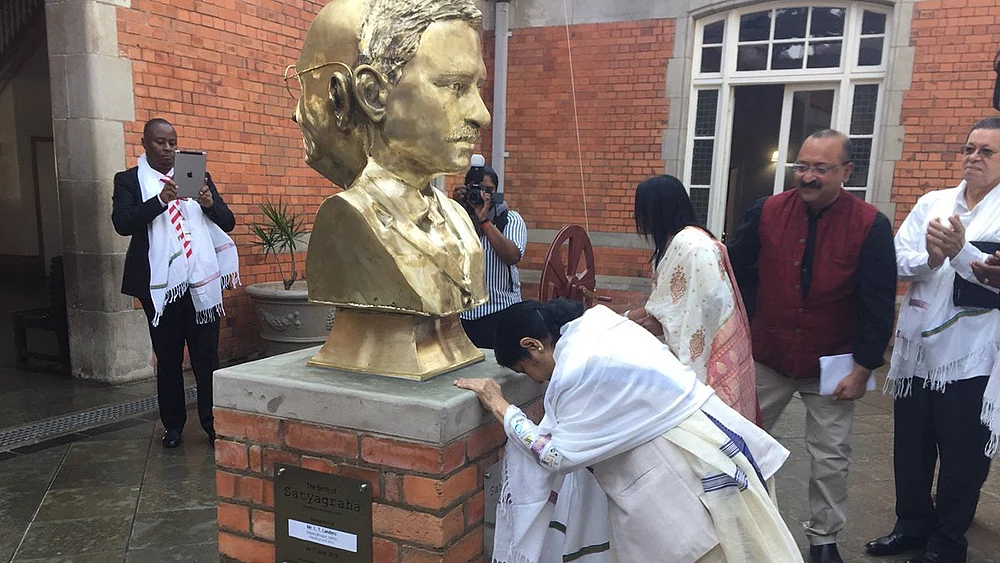India
Mahatma Gandhi: He still inspires millions, far beyond India’s borders
Official representatives from South Africa, Bangladesh and Palestine talk to National Herald about how Mahatma Gandhi’s life is still inspiring for many millions across the globe

“We claim Gandhi the same way as Indians do”
Ben Joubert, Charge d'affairs of South African High Commission in India
As we celebrate 150 years of the birth of Gandhi ji, we remember with fondness what he did for South Africa’s struggle to gain freedom from an oppressive regime. We recall how the events of June 7, 1893, 125 years ago, saw him being forcibly removed from the first class, whites-only carriage of a train in Pietermaritzburg, South Africa. There is good cause to believe that this incident marked his transition from young lawyer Mohandas to an activist Mahatma, a person who would lead India to Independence and put South Africa on an irreversible path of passive resistance and the force of truth.
In 2018, we therefore celebrate 150 years of Gandhiji with the same passion with which we celebrate 100 years of our iconic leader, Nelson Mandela. As South Africans, we claim Gandhiji and his beliefs in the same way Indians do and we continue along the path of this perpetual fight for inclusion and equality.
As we celebrate 25 years of official diplomatic relations with India this year, we will continue in the spirit that that has always influenced our strategic partnership and bilateral relations with India—anchored by a deep and shared history of friendship and solidarity. We salute Gandhiji as a visionary leader, ahead of his time, who has carved a niche for India and South Africa as influential global leaders, who today play pivotal role in the developments of the global South in initiatives such as BRICS, IBSA, IORA, G20 and the multilateral system of the United Nations.
Published: undefined
Syed Muazzem Ali, High Commissioner of Bangladesh: “Bangladesh and India share common history and culture and we also face similar socio-economic challenges. So, I believe, our two countries can work together to translate the spirit of Gandhism in our entire region for the greater benefit of our people”
“We have worked relentlessly to spread his ideas”
Syed Muazzem Ali, High Commissioner of Bangladesh
The noble philosophy of Mahatma Gandhi, commonly known as Gandhism, is based on truth and non-violence and these two elements are vital to establish a compassionate world. It is still relevant in the present global scenario. Our world now stands at a critical juncture and we already have a series of formidable challenges on our hand to fight against menaces such as terrorism, violence, communalism, poverty and hunger. It is in this context that Gandhism is now an imperative for ensuring a world free of violence.
ln Bangladesh, we believe in peaceful settlement of disputes, in secularism, non-communalism, equality, non-discrimination as core principles in our Constitution. Mahatma Gandhi’s ideals can also be a very good basis for taking the Bangladesh-India relations forward. Prime Ministers Narendra Modi and Sheikh Hasina have demonstrated how peacefully and amicably, disputes between the two countries could be settled, when the historic Land Boundary Agreement was signed.
It is a matter of great delight that the 'Gandhi Ashram Trust' in Bangladesh, with cooperation from Bangladesh Government, has been relentlessly working to spread the ideology of Mahatma Gandhi. Bangladesh and India share common history and culture and we also face similar socio-economic challenges. So, I believe, our two countries can work together to translate the spirit of Gandhism in our entire region for the greater benefit of our people.
Published: undefined
Ben Joubert, Charge d’affairs of South African High Commission in India: “In 2018, we therefore celebrate 150 years of Gandhiji with the same passion with which we celebrate 100 years of our iconic leader, Nelson Mandela. As South Africans, we claim Gandhiji and his beliefs in the same way Indians do”
“Gandhi will continue to inspire us till Palestine is free”
Adnan MA Abualhayjaa, Palestine’s Ambassador to India
No modern nation, no modern movement of any seriousness can ignore the contribution of Mahatma Gandhi. Quite early in the 20th century when the criminal collaboration of British Imperialism and general apathy of the international community was hell-bent on disenfranchising the Palestinian people, Mahatma Gandhi ended the debate by saying that Palestine belongs to Palestinians as England belongs to the English people or France belongs to the French, thereby settling the concocted debate of the ownership of Palestinian land. Since the Oslo Accords of 1993, the PLO took the conscious decision to adopt passive resistance, and has stood firm in spite of giving hundreds of lives in sacrifice. We might not have achieved the political goal, but we hold our head high because of the moral high-ground that we have.
We will continue with our fight and Gandhi and his messages will continue to inspire us till we achieve our dream of an independent and sovereign state of Palestine with East Jerusalem as its capital.
The Mahatma still resides in his spirit, ethos and in our struggle in Occupied Palestine. His statue looks over the crime against humanity committed by the apartheid regime, and feels pained. However, we promise to keep striving.Adds Dr Wael Albattrekhi, the deputy head of mission, "Palestinian people will always remember the historic speech that Gandhi delivered in 1942, wherein he called on the British to leave India. The speech still inspires us in our fight for statehood."
Published: undefined
This article first appeared on National Herald on Sunday
Published: undefined
Follow us on: Facebook, Twitter, Google News, Instagram
Join our official telegram channel (@nationalherald) and stay updated with the latest headlines
Published: undefined